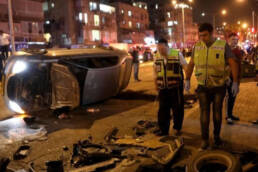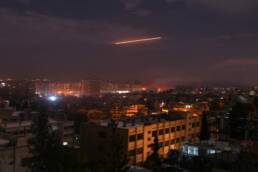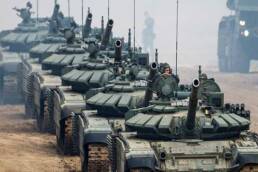Probabilities of War:
The Scenarios of a possible war between Lebanon and Israel were never considered so imminent as it has been the case in the past few weeks or even days. The date is almost determined to be in mid-September, and its spark will be ignited by the burning embers underneath the water of the Mediterranean in the midst of the Lebanese -Palestinian Gas and Oil triangle occupied by Israel, along the line stretching from Ras Naqoura into the heart of the East Mediterranean. Its arena is also in the midst of the oil and gas fields around the Line 23 separating between the Lebanese and Palestinian economic zones occupied by Israel that ravages its resources. The upcoming war seems inevitable due to the multiplying of its explosive elements, to the extent that analysts and experts had predicted that it will not last for more than few days during which the belligerents would aim to achieve their objectives.
Even, the zero hour seems to be depending on Israel’s insistence of ignoring Lebanese rights in the disputed zone, and its possible declaration of launching the digging operations for gas from Karish field by mid-September, and its attempt to take over parts of square 8 of this area while splitting the gas resources in Qana field. This comes at a time when the Secretary-General of Hezbollah Sayyid Hassan Nasrallah alluded to the possibility of targeting the platform the moment its turbines start to operate without Israel accepting his terms, while the Israelis until now are reacting by trying to win time, and delay their reply via the US mediator, to exert the maximum pressures on the Lebanese state and decision makers who are already divided over the negotiating line that should be adopted and on the feasibility of war itself.
It could be said that the scene of war has been completed, unless a compromise gets elaborated by the US mediator Amos Hochstein. Sayyid Nasrallah did not spare sending messages that confirm the readiness and seriousness of the option of reverting to war to break the status quo and inertia imposed by the US – Israel duet on the negotiations which have been ongoing for the past 15 years, in order to prevent Lebanon from benefitting from its oil resources. These messages included sending drones over Karish gas field, and broadcasting videos of coordinates of the platform within the range of Hezbollah missiles. On the other hand, the Israeli side retaliated by putting Karish gas field under the protection of its missiles network and its naval and aerial defense systems, by declaring its readiness for battle for several days against Lebanon, and by promoting the suburb doctrine elaborated by the Israeli Chief of Staff Gadi Eisenkot which is based on the full destruction of the Hezbollah base in the southern suburb of Beirut on the Urban, social, and demographic levels.
So, we are not far from witnessing a declared war, with the combination of all elements that are leading to it, which is something that is not surprising for any side on the shores of the east Mediterranean, if Israel executes its threats by starting to dig for gas without taking into consideration the Lebanese demands.
Lebanon and the option of war
What are the cards of Hezbollah to initiate war? We need to admit the usual weak stance of the Lebanese states and its institutions, and its abiding by the US threats including not depositing a map that demarcates the Lebanese economic zone with Line 29 as its highest negotiating level. Had the Lebanese state done this, it would have been capable to include part of Karish gas field and the Palestinian zone within the disputed zone, which would have strengthened its negotiating stance. In light of this, Sayyid Nasrallah has become the real negotiator who is controlling the course of events, claiming not only the whole of Qana field according to a zigzag Line 23, but also the whole of square 8 which Israel is claiming a part of. Sayyid Nasrallah has raised the ceiling of his demands to asking for US guarantees to bring foreign companies to invest in Lebanon’s gas resources, and to protect the Lebanese gas and oil interests from any sanctions that could void the awaited demarcation from its content.
The first card: for the first time since the war of July 2006, Hezbollah has linked its arm and its national dimension to the social-economic crisis, in order to stop the financial deterioration and reestablish economic stability which is instrumental for the Islamic Resistance on its internal front against Israel. This would help to save Lebanon from full disintegration which was caused by a network of US sanctions imposed on the country over the past 15 years. This card enjoys a nearly unanimous support despite the attempts of Hezbollah Lebanese opponents to discredit it. And the whole Lebanese spectrum seems as if it does not have anything to lose in an upcoming war, and the only alternative might be to continue the economic and social collapse without any limit.
The second card: the capacity of the Islamic Resistance to inflict huge damage on the Israeli entity, to target its oil and gas infrastructure, and to prevent international companies from working in the occupied Palestinian economic zone.
The third card: The Unwillingness of the Israeli Entity to go into confrontation with the Islamic Resistance that it does not initiate by itself, that would be swift, lightening, and surprising whose time, place, and duration are determined by Tel Aviv as was the case in most of its previous wars, except for the war of July 2006. By this, Israel aims to avoid that the upcoming war becomes a war of attrition, in order for the balance of threats not to tilt in favor of the Islamic resistance, especially in letting the Islamic Resistance decide to launch a full scale attack on all Israeli platforms without discrimination, at a time when the world is paying full attention to the war in Ukraine, and to the escalation on all international economic fronts.
Israel and the Option of War
What encourages Israel to favor the option of compromise over war is not its “peaceful instinct or its renouncing of violence,” but rather its lack of proper timing due to its internal conditions as its Prime Minister Yair Labid would refrain from waging war on the eve of the parliamentary elections that might decide his political future, noting that he is under huge pressure from the military establishment to allow the Lebanese to benefit from their resources, which would render them more at odds with Hezbollah with the redressing of their economic conditions. The assumption of the Israeli military establishment is that going to war then accepting the terms of Sayyid Nasrallah would grant him a huge political and military victory. The lack of proper timing for Israel is also due to external conditions related to the war in Ukraine, which rendered the gas of the Mediterranean and the need for stability around its fields a European persistent need, noting that Europe is facing a war on its territory in Ukraine between Russia on one hand and the NATO on the other hand, and this war is being waged on a wide front that includes 6 European countries members of the NATO that are supplying Ukraine with weapons, at a time when tension is rising in the South China Sea and Asia in light of the US systematic provocations of China in the Straight of Taiwan. So, the Europeans would not be pleased to witness a war raging near gas and oil fields especially in the East Mediterranean which has become part of the energy security of Europe.
At a time when Europe is hungry for fuel, the European countries are trying to arrange for a substitute for the Russian gas, even if it was with the limited gas resources of the East Mediterranean. On the eve of the European winter, and as the Russians have prevented Europe from filling its reserves during summer, the fields of Qana, Karish, and other fields have become of great importance. Although the production of the fields of the East Mediterranean might not exceed 2.2 percent of global production, the Europeans, and especially the French, made unprecedented offers to the Lebanese, and to the Israelis implicitly, in case they chose to reach a compromise, by speeding up the process of extracting Lebanese oil and gas via Total company, after a period of procrastination in compliance with the US pressures exerted five years ago.
So far, the axis of resistance has been able to contain Israel and prevent it from imposing its hegemony over the East Mediterranean, and was able to enter into the arena of sharing its resources through the gate of Qana field, to become a player that is taken into account, not only with regards to demarcating the maritime borders, but also with regards to distributing the oil fields and building a pipeline network that would link it later to the European market. the latter would become a much bigger battle for it in light of the struggle that is going on to build the platforms that will handle the redistribution process in Europe via Turkey, Cyprus, or Greece. The entry of the Islamic Resistance into the scene of sharing the oil and gas resources has shattered any scenario in which Israel and Europe aimed to impose full control of the supply network, as this entry has shattered all partnership projects to use the gas fields via Arab, Qatari, Emirati, or intermediate companies that would lead to impose normalization of the oil reality with the occupying Israeli entity. In addition, this entry has shattered any project to drive Lebanon into marketing its oil and gas via the pipeline network through which the stolen Palestinian oil and gas pass, noting that this pipeline is part of the pipelines under US control in the Mediterranean that are used in its confrontation with Russia on Ukrainian soil.
All seems to be ready to launch the war scenario in the early hours of mid-September, when the pumps of the Greek Energean platform start to supply gas to the Israeli pipeline network, noting that last March Israel completed constructing the network of pipelines that would transport gas to the occupied Palestinian mainland which is 90 kilometers away from the aforementioned gas field. It is noteworthy that Israel is currently completing to connect the floating platform for extraction, storage, and loading gas into this network. Technicians are supposed to start pumping 630 million cubic meters per day, of an estimated reserve of 40 billion cubic meters that are worth more than $10 billion during the next 6 years of the estimated extraction validity of Karish field. This is a date that could not be bypassed after Sayyid Nasrallah raised the ceiling of his speech to an extent that prevents procrastination, and that prevents postponing the extraction of gas from Karish by Israel as an option that would help avoid war and contains threats, and this is something that the General-Secretary of Hezbollah responded to by threatening to shell all Israeli platforms in the Palestinian sea, which renders war inevitable.
Which Scenario for the war?
Serious Israeli experts and analysts unanimously agree on the scenario of a minimal confrontation against the Islamic Resistance, and that the Israeli army will not initiate military operations against Hezbollah, leaving the Islamic Resistance to choose the time to launch the first strikes. The option of a few days combat, that does not exceed one week, has become the scenario estimated by the Israeli military establishment before Lebanon’s return to the negotiating table and full surrender to the Israeli conditions. These experts say that the military establishment will go to war in case it happens, but that it will seek to get out of it quickly. However, we are in the Middle East, where no one knows when wars will end once they begin.
The scenario of a few days combat is similar to the model of the Israeli aggression against the Islamic Jihad in Gaza and the wave of assassinations of its leaders. However, this scenario would be hard to project onto the Lebanese – Israeli front or would be hard to control, though it is more probable than other scenarios due to the differences in combat size and capabilities between Hezbollah and Islamic Jihad, and due to the huge strategic depth that Hezbollah enjoys, noting that its lines of supply extend deep into Syria and even Iraq. This option reflects the diminishing of Israel’s capability to indulge in a long term full confrontation against an enemy that it already tested during the war of July 2006, when the Islamic resistance combat, missile, and technical capabilities where less than 20 percent of their current size. In addition, it reflects the persistence of the deterrence equation of the Islamic resistance for 15 years.
The Islamic Resistance experts and the experts of the Israeli entity all agree that the first days of the battle will be dominated by non-lethal tactical and military messages that would not lead to casualties on either side, which makes it hard to stop the battle. Experts from both sides agree that the naval front will be the primary scene before targeting the big urban conglomerations, in order to avoid a full wide scale confrontation, that might lead to Samson’s option in the end.
Everyone agrees that slipping into a major confrontation will lead to mutual destruction with unprecedented human and urban losses, which is the term most used by experts while assessing the results of such a scenario. Therefore, this would be the factor that would make the decision makers avoid the option of going into a full -fledged war.
The reality of high-tech arms favors a few days combat scenario, especially that the Islamic Resistance has a fleet of drones and accurate missiles, noting that sending three drones over Energean platform served as an early trial of this scenario, unless there was a need to expand or escalate the confrontation based on scenarios that gradually develop according to needs. This is the primary factor that would affect the decision of both parties, which would lead to moving from a few days limited combats into a regional war that would include the Syrian front, as Sayyid Nasrallah hinted on many occasions.
Many Israeli voices rule out any attempt to test the seriousness of the Islamic Resistance threats to initiate war. On many occasions, Eyal Zisser, an Israeli expert on Lebanon and Syria, warned of underestimating what the General-Secretary of Hezbollah says, favoring the scenario of a limited few days combat, “because Nasrallah shoots even when his back is not against the wall, and when he says he will he does, as history usually shows.” And unless there is an agreement, then Sayyed Nasrallah will prevent Israel from exploiting the natural resources “not only in the disputed area but beyond that.”
#caus #center_for_arab_unity_studies #Israeli_war #Lebanese_resistance #Lebanese_Israeli_war #Gas_of_the_East_Mediterranean #Gas #the_East_Mediterranean
مركز دراسات الوحدة العربية
The urgency for the establishment for an Arab Unity as a means of reaching independence, solutions to political and economic turmoil, and the establishment a network of cooperation and mutual assistant-ship among countries of the region.
We appreciate your support
SUPPORT THE CENTRE FOR ARAB UNITY STUDIES
The Centre is reaching out for its friends and readers for support, whether by ordering our publications and paying for them in hard currency, or through donations. The Centre welcomes any support to boost its resiliency, to ensure its survival, the continuation of its legacy and its commitment to tackle issues facing the Arabs and the Arab world.



